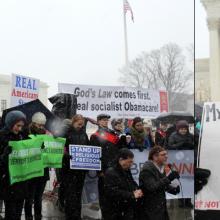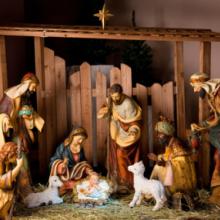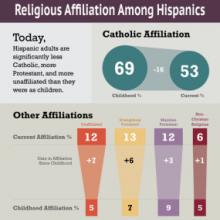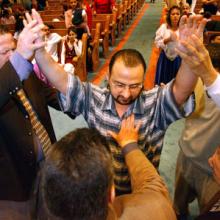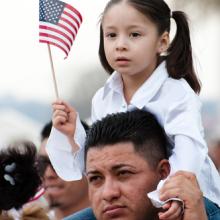public religion research institute
The U.S. Supreme Court is expected to finally issue its ruling this week in the highly anticipated case of the craft companies vs. Obamacare.
Technically, it’s Sebelius v. Hobby Lobby and Conestoga Wood Specialties, a showdown over the Affordable Care Act’s contraception coverage mandate. The core legal question is whether a private company can have religious rights.
But to the general public, this is seen as a showdown between employers — the evangelical Green family behind Hobby Lobby and the Mennonite Hahn familythat owns the Conestoga cabinet company — and the employees’ personal reproductive choices under their insurance.
While conservatives have cast the battle as one for religious freedom, the general public may see it as a showdown over personal health choices.
Yesterday was one of the craziest days in recent American political history. House Majority leader Eric Cantor fell to Tea Party economics professor David Brat in a primary upset no pundit saw coming.
While the early analysis suggested that support for immigration reform may have been what brought Cantor down, exit polling suggests his lack of attention to the concerns of his constituents and his inability to deliver on his promises were a greater factor than the immigration issue. Cantor never brought a vote on immigration to the floor and was never a strong ally on immigration.
Earlier on Tuesday, the Public Religion Research Institute (PRRI) released an immigration poll at the Brookings Institute. Nearly 80 percent of all Americans and nearly two-thirds of white evangelical Protestants remain in support of immigration reform that includes a path towards citizenship or legal status.
More than four in 10 Americans support the Obama administration’s controversial contraception mandate, which requires nonprofits and businesses to provide birth control even if they have religious objections.
The poll from Public Religion Research Institute comes as the Supreme Court prepares to issue its decision in a challenge to the contraception mandate filed by the evangelical owners of the Hobby Lobby arts and crafts chain and a Mennonite-owned wood cabinetry business.
Churches and houses of worship are exempt from the mandate, but nearly 100 nonprofits, colleges and universities, and businesses run by people with religious objections to various forms of contraception have filed lawsuits over the mandate.
The poll found majority support for requiring publicly held corporations (61 percent) and privately owned corporations such as Hobby Lobby (57 percent) to provide contraception coverage at no cost to their employees. In addition, majorities of Americans said religiously affiliated hospitals (56 percent) and religiously affiliated colleges (52 percent) should be covered by the mandate.
“I know what you did last Sunday,” claims the title of a new survey.
That’s according to a new survey by the Public Religion Research Institute released Saturday. The study, to be presented at the national meeting of the American Association for Public Opinion Research, was designed to measure the “social desirability bias in self-reported religious behavior.”
The survey finds that many Christians — and unbelievers, too — will exaggerate about attending worship in live phone interviews. However, when asked in an anonymous online questionnaire, people will answer more realistically.
In recent surveys, the religious “nones” — as in, “none of the above” — appear to lead in the faith marketplace. In fact, “none” could soon be the dominant label U.S. adults pick when asked to describe their religious identity.
And, researchers say, this is already making nones’ attitudes and opinions less predictably liberal on social issues.
Americans’ attitudes toward the lives and choices of gays and lesbians have changed radically since Massachusetts first legalized same — sex marriage a decade ago.
A new survey finds a significant shift toward tolerance across every religious, political, and age group and every region of the country, said Robert P. Jones, CEO of the Public Religion Research Institute. PRRI’s survey, released Wednesday, reveals the ramifications of these changes in family, church, and community life.
“Only the issue of marijuana looks anything like this in terms of rapid movement in favorability,” Jones said. “But with that one exception, it’s unusual to see this much change in a relatively short amount of time.”
Most Americans don’t think God or the devil will be picking the NFL playoff winners this weekend or any other sports champions.
But some will pray nonetheless, and a few will “religiously” perform little game-day rituals just in case.
A survey by Public Religion Research Institute, released Thursday, probes the crossover between team spirit and spirituality.
Most Americans (60 percent) call themselves fans of a particular team. Among this group, several will do a little dance or say a little prayer to help the team along:
- 21 percent (including one in four football fans) will wear special clothes or do special rituals. Donning a team jersey leads the way (66 percent). But some admit they get a little funky with their underwear. One fan wears dirty undershorts on top of his jeans. (No word if these are boxers or briefs.)
- 25 percent (including 31 percent of football fans) have sometimes felt their team has been cursed. (No word on how many are Red Sox fans.)
- 26 percent (including one in three football fans) say they pray to God to help their team. White evangelicals are most likely to lean on the Lord on this: 38 percent will pray, more than any other religious group.
- Football fans are also more likely than other fans to admit praying for their team (33 percent to 21 percent), performing pre-game or game-time rituals (25 percent to 18 percent), or to believe that their team has been cursed (31 percent to 18 percent).
Nine in 10 Americans will celebrate Christmas this year, but a new poll shows that increasing numbers see the holiday as more tinsel than gospel truth.
This year more than ever, Americans prefer that stores and businesses welcome them with the more generic “Happy Holidays” or “Season’s Greetings” than “Merry Christmas,” according to a survey released Tuesday by the Public Religion Research Institute in partnership with Religion News Service.
And for one in four American adults (26 percent), Dec. 25 is simply a cultural holiday, not a religious holy day.
As a law extending workplace protection to gay, bisexual, and transgender workers makes its way through the Senate this week, there’s a shift in the political air: Arguments that stand purely on religious grounds are no longer holding the same degree of political sway they once did.
The rhetoric from Republican and conservative opponents of the Employment Non-Discrimination Act is moving away from the morality of the bedroom and into the business sphere. More politicians are fighting ENDA as a bad economic move, not as a break with the Bible.
ENDA would “increase frivolous litigation and cost American jobs, especially small business jobs,” Speaker John A. Boehner said in a statement released Monday, which made clear the Senate bill is dead on arrival in the GOP-controlled House.
Libertarians do not consider themselves a part of the Tea Party movement, a new study on public religion found.
The study, “In Search of Libertarians in America,” is the 2013 installment of the annual American Values Survey gathered by the nonpartisan Public Religion Research Institute and was released last Tuesday.
“Libertarians are significantly more likely to be non-Hispanic white, male, and young,” according to the report. Of the seven percent of all Americans who are libertarians by PRRI’s definition, 94 percent are non-Hispanic whites, 68 percent are male, and 62 percent are under the age of 50.
When it comes to religious affiliation, libertarians tended to be either white mainline Protestants (27 percent) or religiously unaffiliated (27 percent). No libertarians identified as black Protestant and only 11 percent identified as Catholic.
The number of Hispanic-Americans who say they adhere to no religion is growing and now rivals the number of Hispanic evangelicals, a new study has found.
The share of Hispanics living in the U.S. who say they are atheist, agnostic, or have no religious affiliation has reached 12 percent, according to the 2013 Hispanic Values Survey conducted by the Public Religion Research Institute. That is double the rate reported in 1990 by the American Religious Identification Survey.
Researchers say Hispanic “nones” are now statistically equal to the number of U.S. Hispanic evangelical Protestants — 13 percent — and warn of a religious divide in the Hispanic community that will be felt for decades to come.
A new survey of Hispanic political and religious values finds they’re overwhelmingly Democrats who hold a largely negative view of the Republican Party.
The 2013 Hispanic Values Survey of 1,563 Hispanic adults was conducted online in both English and Spanish between Aug. 23 and Sept. 3. It has a margin of error of plus or minus 3.7 percentage points.
The survey found that most Hispanics are delighted with Argentine-born Pope Francis, but they hold slightly less favorable views of the Catholic Church. While nearly 69 percent look favorably on the pope, only 54 percent see the institution in a favorable light.
When it comes to God and country, white evangelicals report the strongest levels of patriotic feelings in a new poll, with more than two-thirds (68 percent) saying they are extremely proud to be an American.
That figure was markedly higher than for white mainline Protestants (56 percent), minority Christians (49 percent), Catholics (48 percent) and religiously unaffiliated Americans (39 percent), according to the study, conducted by the Washington-based Public Religion Research Institute in partnership with Religion News Service.
White evangelicals are also more likely than any other religious group surveyed to believe that God has granted the U.S. a special role in history (84 percent) and to say they will likely attend a public July 4th celebration (62 percent).
Half of young Christians favor the legalization of marijuana, says a new survey out today from the Public Religion Research Institute.
Perhaps predictably, survey results break down by age, with 50 percent of Christian young adults supporting legalization and only 22 percent of Christian seniors (65 and older) in support.
More than six in ten Americans support a pathway to citizenship for immigrants, a survey out today from the Public Religion Research Institute finds.
63 percent of Americans support a path to citizenship, including a majority of Republicans, Independents, and Democrats, and majorities among every major religious group.
“Proponents of immigration reform are unlikely to find a more favorable moment [in the political climate] than now,” said EJ Dionne, Senior Fellow at the Brookings Institution and a columnist at the Washington Post, as part of a survey panel this morning.
Image via Church Sign Generator, http://www.signgenerator.org/church/
They may not be as large as Catholics or as active as evangelicals, but white mainline Protestants have a big thing going for them this election cycle: they are divided, and possibly persuadable.
That's according to a new poll released today (2/2/12), which found white mainline Protestants are more evenly split between President Obama and his Republican challengers than other religious groups.
"They're the most important ignored religious group in the country," said Dan Cox, research director at the Public Religion Research Institute, which conducted the poll in partnership with Religion News Service.
In a matchup between Obama and GOP front-runner Mitt Romney, mainline Protestant voters are nearly evenly divided, with 41 percent supporting Obama and 43 percent for Romney. The same holds true between Obama and former House Speaker Newt Gingrich — each is the choice of 41 percent of white mainline Protestants.

"It's Complicated." Photo by Jenny Poole via Wylio http://www.wylio.com/credits/Flickr/4752357353
A fascinating new study by the Public Religion Research Institute found that two-thirds of all Americans identify with both the "pro-life" and "pro-choice" labels simultaneously.
The PRRI reports that 7-in-10 Americans say the term “pro-choice” describes them "somewhat" or "very well," and nearly two-thirds simultaneously say the term “pro-life” describes them "somewhat" or "very well."
"This overlapping identity is present in virtually every demographic group," the report said.
In one of the largest public opinoin surveys ever conducted on the subject of abortion and religion, PRRI's study, "Millennials, Abortion and Religion Survey," uncovered "large generational differences on two issues that have often been linked in political discourse: abortion and same-sex marriage."
According to the survey, Americans ages 18-29 (a.k.a., "Millennials") strongly support legal access to abortion services in their local communities despite being conflicted about the morality of abortion itself.

"Sarah Palin, Public Speaker." By DonkeyHotey via Wylio (http://bit.ly/vkaaOW)
A new poll out from the Public Religion Research Institute and Religion News Service shows that just about the same number of American’s feel that Occupy Wall Street shares their values as does the Tea Party.
The split comes down partisan lines but is also generational. Eighteen-to-thirty-nine year olds are much more likely to feel that Occupy Wall Street shares their values then does the Tea Party.
What will be of great interest to watch over the coming months is the overlap between concerns of both movements. For example, neither group is a fan of the bank bailout and express an overwhelming feeling that elected officials aren’t responsive or accountable to those who elected them. I’m not arguing they will join forces any time soon, but they still could find a few areas of agreement.
What convinced me that common ground might be possible was another unlikely event, I read a column by Sarah Palin that I liked.
A new poll released this morning by Public Religion Research Institute shows the American public has clear ideas about what steps political leaders should take to reduce the federal deficit.
The poll shows that a majority of white evangelicals are opposed to cutting federal anti-poverty programs for the poor and nearly three-quarters of white evangelicals oppose cutting funding for religious organizations that help the poor.
The poll, based on a survey of 1,002 American adults performed November 10 -14, also shows a nation divided both by political affiliation and generation when it comes to attitudes towards Occupy Wall Street and the Tea Party.
The survey found that nearly 7-in-10 (68 percent) of Americans say that in order to reduce the deficit, it’s fair to ask wealthier Americans to pay a greater percentage in taxes than the middle class or those less well off.
